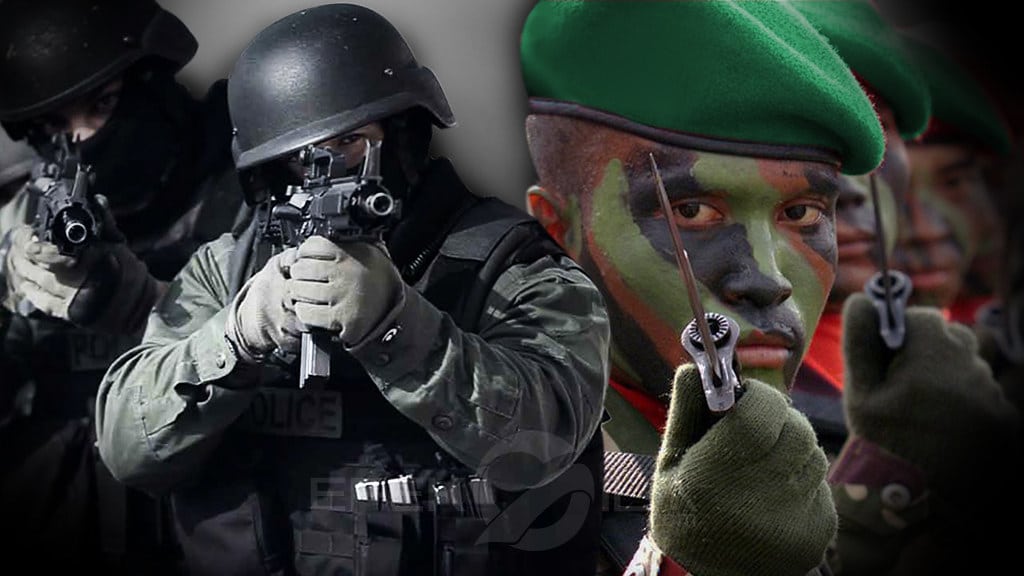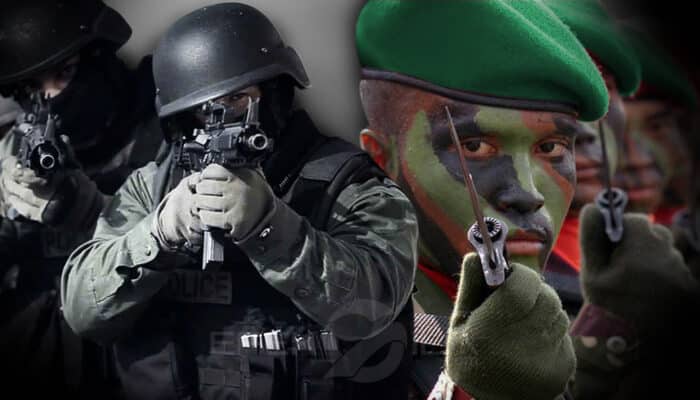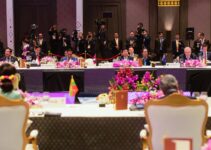Contoh Kasus Pelanggaran Netralitas Tni Dan Polri Di Pilkada Majalengka, examines allegations of neutrality violations by the Indonesian military (TNI) and police (Polri) during the 2023 Majalengka regional elections (Pilkada). This case study delves into the legal framework governing neutrality in Indonesian elections, analyzes specific allegations against the TNI and Polri, and explores the potential impact on the election’s integrity and public trust.
The Airtag is a great tool for tracking your belongings, but is it compatible with Android phones? Find out in this article.
The Pilkada in Majalengka, a district in West Java, was marked by intense political competition, with candidates representing various political parties vying for the position of Regent. Allegations of neutrality violations surfaced during the campaign period, leading to concerns about the fairness and transparency of the election process.
This case study aims to shed light on these allegations, providing a detailed analysis of the events and their potential consequences.
Android tablets are becoming increasingly popular. Check out the latest releases and reviews in this article.
Understanding Neutrality in Indonesian Elections
In Indonesia, the principle of neutrality is paramount during elections, particularly for the Indonesian National Armed Forces (TNI) and the Indonesian National Police (Polri). The legal framework governing their neutrality is enshrined in various laws and regulations, aiming to ensure a fair and democratic electoral process.
Witnessing a solar eclipse is a truly unforgettable experience. Discover how long the October 2024 solar eclipse will last in this article.
The neutrality of these institutions is crucial to maintain public trust in the integrity of elections and prevent any manipulation or undue influence on the outcome.
Legal Framework for Neutrality
The legal framework for neutrality during elections is primarily based on:
- Law Number 7 of 2017 on General Elections: This law Artikels the principles of neutrality for all state institutions, including the TNI and Polri, during elections. It prohibits them from engaging in activities that could be interpreted as supporting or opposing any particular candidate or party.
Political education and voter participation are crucial for a successful election. Learn more about these aspects in the Majalengka elections in this article.
- Law Number 2 of 2002 on the Indonesian National Police: This law emphasizes the role of the Polri in maintaining security and order during elections, while upholding neutrality and impartiality. It prohibits police officers from engaging in partisan activities.
- Law Number 34 of 2004 on the Indonesian National Armed Forces: This law Artikels the TNI’s role in maintaining national security and assisting with disaster relief, but also mandates their neutrality during elections. It prohibits military personnel from engaging in political activities or influencing the electoral process.
Examples of Past Neutrality Violations
Despite the legal framework, there have been instances where the TNI or Polri have been accused of violating neutrality during elections. Some notable examples include:
- 2014 Presidential Election: There were allegations of police officers supporting a particular candidate by campaigning for them or intimidating voters. These allegations raised concerns about the neutrality of the Polri and their role in ensuring a fair election.
- 2017 Regional Elections: In several regions, there were reports of military personnel being involved in campaigning activities, allegedly supporting certain candidates. This raised questions about the TNI’s adherence to neutrality and its commitment to the democratic process.
Consequences of Neutrality Violations
Violations of neutrality by the TNI and Polri can have serious consequences, including:
- Erosion of Public Trust: When the TNI or Polri are perceived as biased or partisan, it undermines public trust in their impartiality and their ability to uphold the law. This can lead to a decrease in public confidence in the electoral process and the institutions responsible for ensuring its integrity.
The end of daylight saving time in October 2024 will have a significant impact on our daily lives. Discover what changes to expect in this article.
- Political Instability: Neutrality violations can exacerbate political tensions and contribute to instability. When the military or police are seen as favoring one side, it can lead to accusations of unfairness and trigger protests or unrest.
- Legal Sanctions: Individuals within the TNI or Polri who violate neutrality laws can face disciplinary action, including demotion, dismissal, or even criminal prosecution.
Pilkada Majalengka: Context and Background
The Pilkada (Regional Elections) in Majalengka, a regency in West Java, took place in [Year of Pilkada]. The election was characterized by a complex political landscape and a number of socio-economic factors that influenced the campaign and the outcome.
Want to understand the factors influencing the outcome of the Majalengka elections? Find out more in this article.
Political Landscape
The political landscape of Majalengka during the Pilkada was marked by:
- [Name of Party]: This party, led by [Name of Party Leader], had a strong presence in the region and fielded a candidate for the position of [Position].
- [Name of Party]: This party, known for its [Party Ideology], also fielded a candidate who was a prominent figure in the local community.
- [Name of Party]: This party, known for its [Party Ideology], was considered a strong contender, with a candidate who was seen as a potential challenger to the incumbent.
Key Candidates
The key candidates in the Pilkada were:
- [Name of Candidate 1]: This candidate represented [Name of Party] and was known for [Key Achievements/Qualities].
- [Name of Candidate 2]: This candidate represented [Name of Party] and was known for [Key Achievements/Qualities].
- [Name of Candidate 3]: This candidate represented [Name of Party] and was known for [Key Achievements/Qualities].
Socio-Economic Factors
The Pilkada in Majalengka was influenced by a number of socio-economic factors, including:
- [Economic Factor 1]: [Explain the impact of this factor on the election].
- [Economic Factor 2]: [Explain the impact of this factor on the election].
- [Social Factor 1]: [Explain the impact of this factor on the election].
- [Social Factor 2]: [Explain the impact of this factor on the election].
Allegations of Neutrality Violations in Majalengka
During the Pilkada in Majalengka, there were allegations that the TNI and Polri violated their neutrality, potentially influencing the outcome of the election. These allegations were widely reported in the media and raised concerns among the public about the integrity of the electoral process.
The ongoing Israel-Hamas war is a complex situation with many contributing factors. Get a deeper understanding of the main causes in this article.
Specific Allegations
The allegations of neutrality violations in Majalengka included:
- Campaigning for a Specific Candidate: There were reports of [TNI/Polri personnel] being seen at campaign events for [Name of Candidate], allegedly providing support and assistance. Witnesses claimed that [TNI/Polri personnel] were seen distributing campaign materials or engaging in other activities that could be interpreted as supporting a particular candidate.
The World Cup Cricket 2024 is generating a lot of buzz on social media. Discover the hottest trends and conversations in this article.
- Intimidation of Voters: Some voters reported feeling intimidated by [TNI/Polri personnel] during the election. They claimed that they were threatened or coerced into voting for a specific candidate. These allegations were particularly concerning as they suggested a potential abuse of power by the security forces to influence the voting process.
Is the Airtag Y Android compatible? Find out the latest information and updates on this exciting new technology in this article.
- Biased Law Enforcement: There were also allegations of [TNI/Polri personnel] selectively enforcing laws or regulations in a way that favored a particular candidate. For example, some reports claimed that [TNI/Polri personnel] were more lenient with supporters of [Name of Candidate] while being stricter with supporters of other candidates.
Wondering what’s going on in Jason Momoa’s love life? Check out the latest updates on his relationships and personal life in this article.
Evidence Supporting the Allegations
The allegations of neutrality violations were supported by a number of sources, including:
- Witness Testimonies: Numerous individuals came forward to report their experiences with [TNI/Polri personnel] during the Pilkada, providing firsthand accounts of alleged intimidation, campaigning, and biased law enforcement.
- Media Reports: Local and national media outlets published articles and reports detailing the allegations of neutrality violations. These reports often included interviews with witnesses, analysis of the situation, and commentary from political experts.
- Official Statements: Some official statements, such as those issued by political parties or election monitoring organizations, also raised concerns about neutrality violations and called for investigations into the allegations.
Analysis of the Allegations: Contoh Kasus Pelanggaran Netralitas Tni Dan Polri Di Pilkada Majalengka
The allegations of neutrality violations in Majalengka require careful analysis to assess their credibility and potential motivations. It is important to consider the context of the Pilkada, the political landscape, and the potential impact of these actions on the electoral process.
Looking for the best deals on toys and games for kids this Black Friday? Find out what’s on offer in this article.
Credibility of the Allegations
The credibility of the allegations can be evaluated by considering the following factors:
- Number and Consistency of Witnesses: If multiple witnesses provide consistent accounts of similar incidents, it strengthens the credibility of the allegations.
- Evidence Supporting the Claims: The presence of supporting evidence, such as photographs, videos, or official documents, can add weight to the allegations.
- Lack of Counter-Evidence: If there is a lack of credible evidence to refute the allegations, it can further strengthen their credibility.
Potential Motivations
The motivations behind the alleged neutrality violations could be:
- Political Influence: Some individuals within the TNI or Polri may have been motivated by political allegiances, seeking to influence the outcome of the election in favor of a particular candidate.
- Personal Gain: Others may have been motivated by personal gain, such as seeking favors or opportunities from a winning candidate.
- Lack of Awareness: In some cases, the alleged violations may have been unintentional, resulting from a lack of awareness or understanding of the legal framework for neutrality.
Comparison with Legal Framework, Contoh Kasus Pelanggaran Netralitas Tni Dan Polri Di Pilkada Majalengka
The alleged actions of the TNI and Polri in Majalengka should be compared with the established legal framework for neutrality during elections. If the allegations are substantiated, they would constitute violations of the laws and regulations governing the conduct of the security forces during elections.
Get ready for a spooky good time! The Goosebumps Halloween event in October 2024 promises chills and thrills for all ages. Find out more in this article.
Impact of Allegations on the Pilkada
The allegations of neutrality violations in Majalengka had a significant impact on the Pilkada, potentially influencing the outcome of the election and undermining public trust in the electoral process.
Curious about the upcoming elections in Majalengka? Find out which regions will be holding elections in this list.
Impact on Election Outcome
The allegations raised concerns about the fairness and integrity of the election, potentially affecting the outcome. If the allegations are true, they could have swayed voters’ decisions or created an atmosphere of fear and intimidation, ultimately impacting the results of the Pilkada.
Public Perception and Trust
The allegations also damaged public perception of the TNI and Polri, eroding trust in their neutrality and impartiality. This could have long-term consequences for the relationship between the security forces and the public, making it more difficult for them to maintain order and security in the future.
The World Series is always a big event, but this year’s implications and legacy will be especially interesting. Read about them in this article.
Steps Taken to Address the Allegations
To address the allegations of neutrality violations, steps were taken to ensure future neutrality, including:
- Investigations: Investigations were conducted by [Name of Investigating Body] to determine the validity of the allegations and identify any individuals responsible for violating neutrality laws.
- Disciplinary Action: Individuals found to have violated neutrality laws faced disciplinary action, ranging from demotion to dismissal from service.
- Public Awareness Campaigns: Public awareness campaigns were conducted to educate the TNI and Polri on the importance of neutrality during elections and to emphasize the legal consequences of violating neutrality laws.
Final Review

The case of alleged neutrality violations in Majalengka’s Pilkada highlights the critical role of the TNI and Polri in maintaining the integrity of democratic processes in Indonesia. While the allegations require thorough investigation and due process, they serve as a reminder of the importance of upholding neutrality and accountability within security forces during elections.
This case study underscores the need for ongoing dialogue and mechanisms to ensure that the TNI and Polri remain impartial and professional in their interactions with the public and political actors, fostering public trust and confidence in the electoral system.
Common Queries
What are the potential consequences of neutrality violations by the TNI and Polri?
The October 2024 lunar eclipse is a celestial event you won’t want to miss! Find out how long this stunning phenomenon will last in this article.
Violations of neutrality can undermine public trust in the TNI and Polri, damage the integrity of the electoral process, and potentially lead to legal sanctions against individuals involved.
What steps can be taken to address allegations of neutrality violations and ensure future neutrality?
Addressing allegations requires thorough investigations, independent oversight, and accountability measures. The TNI and Polri should implement clear guidelines and training programs to reinforce neutrality principles, while the public should be encouraged to report any suspected violations.









